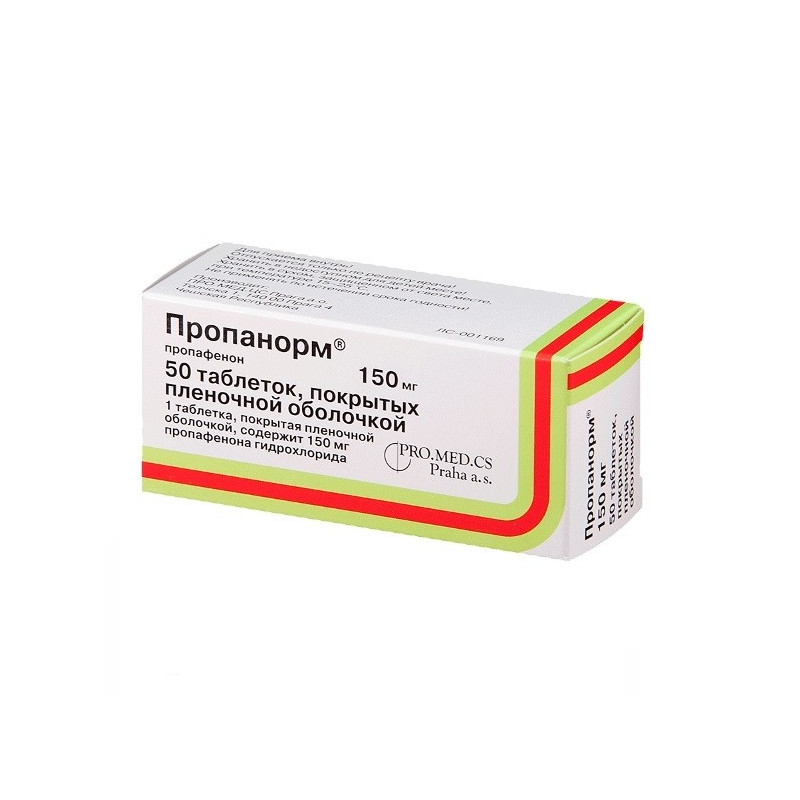



 All payments are encrypted via SSL
All payments are encrypted via SSL
 Full Refund if you haven't received your order
Full Refund if you haven't received your order
PROPANORM TAB. P / O 150MG №50 **
Pharmacological group
Antiarrhythmic membrane stabilizing agents of group 1A
International non-proprietary name
Propafenone
Pharmacy sales terms
Prescription
Composition
| Coated Tablets | 1 tab. |
| propafenone hydrochloride | 150 mg |
| 300 mg | |
| Excipients: MCC granulated; corn starch; copovidone; croscarmellose sodium; Magnesium stearate; sodium lauryl sulfate; hypromellose 5; macrogol 6000; titanium dioxide; emulsion of dimethicone with silicon dioxide |
in a blister strip package 10 pcs.; in a carton pack 5 packs.
prevention and treatment of supraventricular and ventricular extrasystoles, paroxysmal arrhythmias (supraventricular - atrial fibrillation and atrial flutter, WPW syndrome), atrioventricular re-entry tachycardia;
prevention of sustained monomorphic ventricular tachycardia.
hypersensitivity to the drug;
digoxin intoxication;
severe forms of chronic heart failure (decompensated), uncontrolled chronic heart failure;
cardiogenic shock (with the exception of arterial hypotension due to tachycardia and antiarrhythmic shock);
severe bradycardia and severe hypotension;
SA blockade, violation of intraatrial conduction; blockade of bundle branch block; intraventricular bifascicular blockade and AV block II – III degree (without pacemaker);
sick sinus syndrome; tachycardia-bradycardia syndrome;
myocardial infarction;
lactation period;
age up to 18 years (efficacy and safety have not been established).
Carefully:
chronic obstructive pulmonary disease (COPD);
myasthenia gravis (including myasthenia gravis);
heart failure (ejection fraction - less than 30%), cardiomyopathy, arterial hypotension, the presence of a permanent or temporary pacemaker;
hepatic cholestasis, hepatic and / or renal failure;
combination with other antiarrhythmic drugs similar in effect on cardiac electrophysiology;
electrolyte disturbances (must be necessarily corrected before the appointment of propafenone);
age over 70 years.
Cardiovascular: bradycardia, AV dissociation, ventricular tachyarrhythmias; angina pectoris, worsening of the course of heart failure (in patients with reduced left ventricular function), SA block, AV block, intraventricular conduction disturbances, supraventricular tachyarrhythmias, when taken in high doses - orthostatic hypotension.
Gastrointestinal: change in taste, dry mouth, bitter taste in the mouth, nausea, loss of appetite, feeling of heaviness in the epigastrium, constipation or diarrhea, rarely - impaired liver function,cholestatic jaundice, cholestasis.
From the side of the central nervous system: headache, dizziness, rarely - blurred vision, diplopia, convulsions.
Laboratory values: leukopenia, agranulocytosis, increased bleeding time, thrombocytopenia, the appearance of antinuclear antibodies.
From the genitourinary system: oligospermia, reduced potency.
Allergic reactions: skin rash, pruritus, rash, redness of the skin, urticaria, lupus-like syndrome.
Other: weakness, bronchospasm, hemorrhagic rash on the skin.
Interaction with other drugs
Can not be combined with Lidocaine (enhanced cardiodepressive effect).
Increases plasma concentration of propranolol, Metoprolol, Digoxin (increases the risk of glycoside intoxication), indirect anticoagulants, cyclosporine. Enhances the effect of Warfarin (blocks metabolism).
With simultaneous use with beta-blockers, tricyclic antidepressants may increase antiarrhythmic action, with local anesthetics - an increased risk of damage to the central nervous system.
Zimetidin and quinidine, slowing down the metabolism, increase the concentration of propafenone in plasma by 20%, rifampicin - reduces.
Amiodarone increases the risk of pirouette tachycardia.
Drugs that inhibit SA and AV nodes and have a negative inotropic effect, increase the risk of side effects.
Drugs that inhibit bone marrow hematopoiesis, increase the risk of myelosuppression.
Intoxication can occur with a single dose of 2 times the daily; symptoms of intoxication appear after 1 h, maximum - after a few hours.
Symptoms: persistent decrease in blood pressure, nausea, dry mouth, vomiting, mydriasis, drowsiness, extrapyramidal disorders, confusion, bradycardia, lengthening of the QT interval, impaired intra atrial and intraventricular conduction, ventricular tachyarrhythmias, paroxysms of polymorphic ventricular tachycardia, austerity, and austerity., cramps, delirium, pulmonary edema.
Treatment: gastric lavage, defibrillation, the introduction of dobutamine, diazepam; if necessary, artificial ventilation of the lungs and indirect heart massage. Hemodialysis is not effective.
Dosing and Administration
Inside after meal. pills should be swallowed whole, washed down with a small amount of water.
The dosage regimen is set individually and adjusted by the doctor.
To relieve paroxysm of atrial fibrillation, a loading dose of 600 mg is used - once orally.
Typically, the daily dose is 450 mg (3 times a day, 150 mg every 8 hours). If necessary, the dose is increased gradually (every 3-4 days) to 600 mg / day for 2 doses, or to a maximum of 900 mg / day for 3 doses.
If during treatment, the expansion of the QRS complex or QT interval by more than 20% compared with baseline values, or prolongation of the PQ interval by more than 50%, prolongation of the QT interval by more than 500 ms, increase in the frequency and severity of arrhythmia, should be reduced. or temporarily interrupt the use of Propanorm ®.
In patients older than 70 years, as well as in patients with a body weight less than 70 kg, smaller doses are used (the first dose is given in the hospital under the supervision of an ECG and blood pressure).
In case of abnormal liver function (cumulation is possible) Propanorm® used in doses that make up 20–30% of the usual, in case of impaired renal function (Cl creatinine less than 10%), the initial dose is 50% of the initial dose.
special instructions
Treatment should be under the control of electrolyte balance (especially potassium levels) and ECG. It is recommended to periodically determine the activity of transaminases, antinuclear antibodies. In patients with an implanted pacemaker, it is necessary to take into account an increase in the defibrillation threshold and pacing, which makes it necessary to correct the parameters of the pacemaker. When abnormal liver function (cumulation possible) is used in doses that make up 20-30% of the usual. Caution is prescribed to drivers of vehicles and persons engaged in activities requiring increased attention and speed of reaction.
Storage conditions
List B. In the dark place at a temperature of 15-25 ° C.
